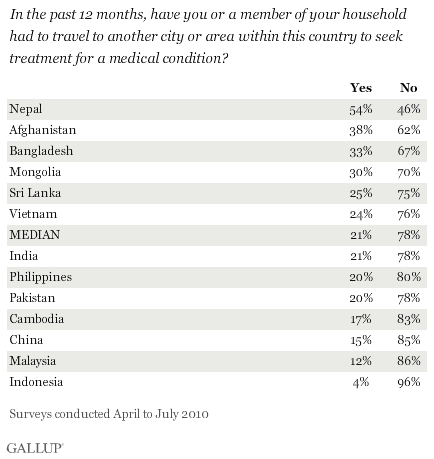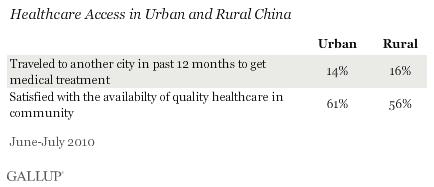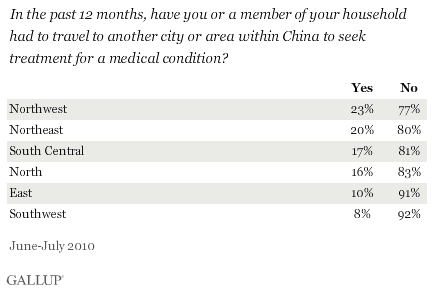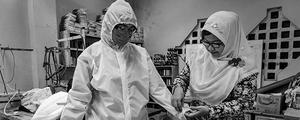WASHINGTON, D.C. -- As China starts the final year of its aggressive three-year plan to provide "safe, effective, convenient, and affordable" healthcare to all Chinese, about one in seven (15%) residents say at least one member of their household needed to travel to another community for medical care in the past year. This percentage is lower than the median of 21% across 13 Asian countries Gallup surveyed.

One of the primary goals of China's healthcare reform is that residents will not need to travel far for care. According to Xinhua, the government allocated $2.9 billion -- out of the $129 billion it was expected to spend on the reform between 2009 and 2011 -- for the construction of more than 5,000 hospitals in 2009. More than 10,000 health institutions and about 70,000 village clinics reportedly were built.
Healthcare services in rural areas of China typically lack the same level of access and quality present in urban areas. But perhaps reflecting recent investments in rural care, rural Chinese (16%) were no more likely than urban Chinese (14%) to report traveling outside their city or community for medical care. They are slightly less satisfied, however, with the availability of quality medical care in their communities. Fifty-six percent of rural residents are satisfied versus 61% of urban residents.

The need to travel for medical care is more common in some regions of China where access to quality care may be less likely. Chinese living in the Southwest (8%) and largely urban eastern coastal regions (10%) are least likely to travel outside their communities for medical care, while those living in the Northwest (23%) and Northeast (20%) are the most likely.

Bottom Line
When a medical need arises, Gallup data show some Chinese are leaving their communities for treatment elsewhere. Perhaps reflecting gains in rural access, rural Chinese are no more likely to say they traveled for medical care than urban Chinese, but regional differences still pose a challenge. As China continues on the path of major healthcare reforms that affect urban and rural populations, policymakers might consider the need for medical travel as one metric of success.
For complete data sets or custom research from the more than 150 countries Gallup continually surveys, please contact SocialandEconomicAnalysis@gallup.com or call 202.715.3030.
Survey Methods
Results are based on face-to-face and land-line telephone interviews with 4,151 adults, aged 15 and older, conducted between June and July 2010 in China. For results based on the total sample of national adults, one can say with 95% confidence that the margin of error is ±2.2 percentage points. The margin of error is higher for regional results. Surveys in other countries mentioned in this article were conducted between April and July 2010.
The margin of error reflects the influence of data weighting. In addition to sampling error, question wording and practical difficulties in conducting surveys can introduce error or bias into the findings of public opinion polls.
